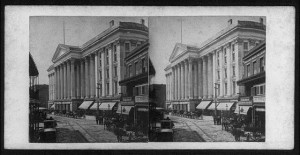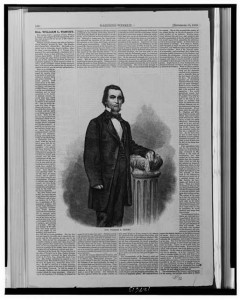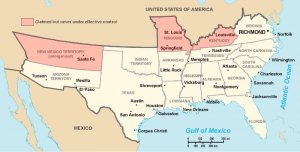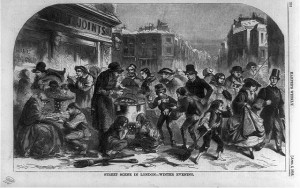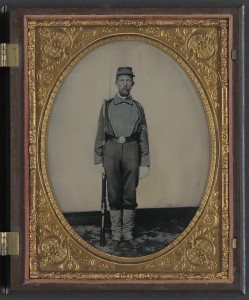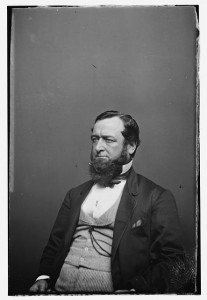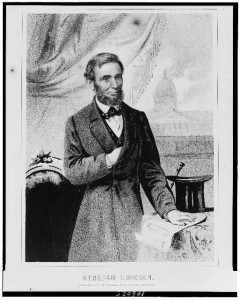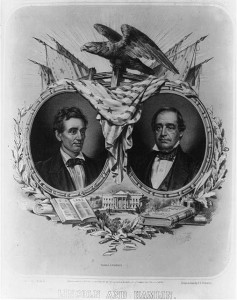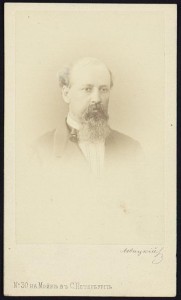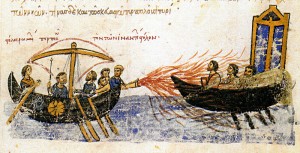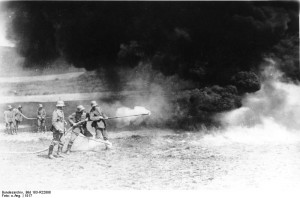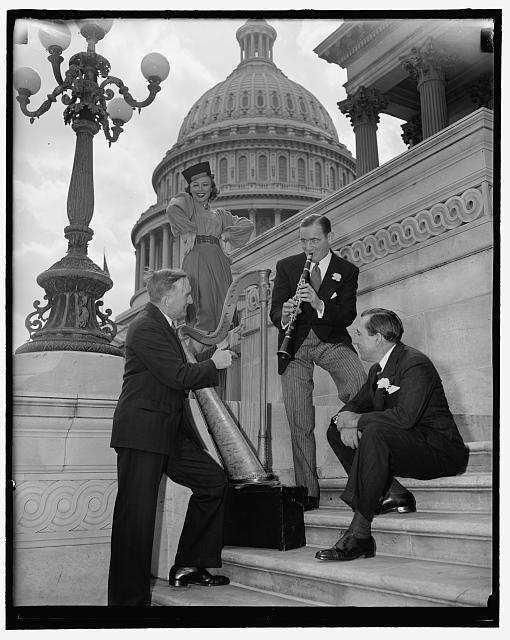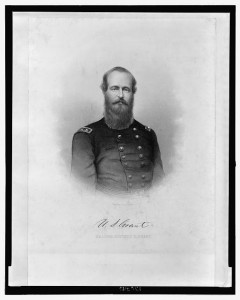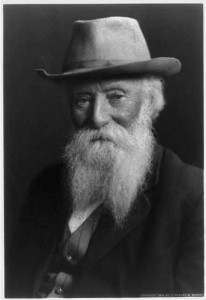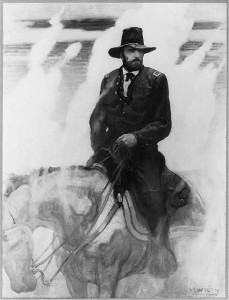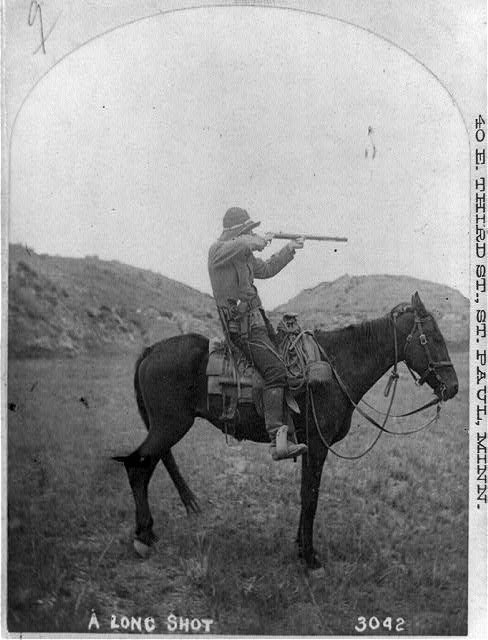
It's a coastal thing - from Savannah to St. Augustine
In early March a Union naval expedition under Samuel F. Du Pont captured and occupied the area around Fernadina, Florida. During the occupation a correspondent found an early 1861 letter from then U.S. Senator David Yulee to a friend back home. The letter indicates that southern senators were in consultation with the secession conventions then going on in their home states. While still nominally supporting the U.S. Constitution, the senators were plotting with their home states on the most effective timing for secession. The senators wanted their states to secede as soon as possible but thought it might possibly be advantageous to hold off, so that the senators could remain in Congress and hamstring the Buchanan administration and the Republicans in Congress. The Times makes hay out of this great primary source from fourteen months earlier.
From The New-York Times March 15, 1862:
Treason in Embryo A Remarkable Document.
Our correspondent with the expedition which lately took possession of Fernandina, Fla., transmits us a number of letters, documents, memoranda, etc., which he picked up in the town after the hasty hegira of the inhabitants on the approach of the Union force. Among these, curiously enough, turns up a letter dated Washington, Jan. 7, 1861, written by YULEE, then United States Senator, addressed to “JOSEPH FINEGAN, Esq., Tallahassee, Fla.,” which gives us a most interesting glimpse of the secret doings of the chief secession conspirators at that period. The telegraphic columns of the TIMES of that same day (Jan. 7, 1861,) contained the following Washington dispatch: “The Southern Senators last night (Jan. 6) held a conference, and telegraphed to the Conventions of their respective States to advise immediate secession.” Now, the present letter is a report by YULEE, who was present at this “consultation,” as he calls it, of the resolutions adopted on this occasion, transmitted to the said FINEGAN, who, by the way, was a member of the “Sovereignty Convention” of Florida, then sitting in the town of Tallahassee. The original of this remarkable historical document, which was probably written by YULEE in his seat in the United States Senate, is now before us. It is as follows:
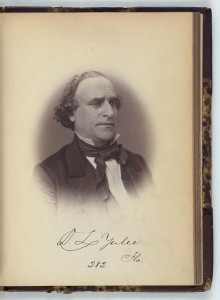
Should we stay in the senate to hinder Republican plans?
WASHINGTON, Jan. 7, 1861.
Mr DEAR SIR — On the other side is a copy of resolutions adopted at a consultation of the Senators from the Seceding States — in which Georgia, Alabama, Louisiana, Arkansas, Texas, Mississippi and Florida were present.
The idea of the meeting was that the States should go out at once, and provide for the early organization of a Confederate Government, not later than 15 February. This time is allowed to enable Louisiana and Texas to participate. It seemed to be opinion [sic] that if we left here force, loan and volunteer bills might be passed, which would put Mr. LINCOLN in immediate condition for hostilities — whereas if [sic] by remaining in our places until the 4th of March, it is thought we can keep the hands of Mr. Buchanan tied, and disable the Republicans from effecting any legislation which will strengthen the hands of the incoming Administration.
The resolutions will be sent by the delegation to the President of the Convention. I have not been able to find Mr. MALLORY this morning. HAWKINS [the member from Florida] is in Connecticut. I have therefore thought it best to send you this copy of the resolutions.
In haste
Yours truly D.L. YULEE.
JOSEPH FINEGAN Esq (“Sovereignty Conference”) Tallahassee Fa.
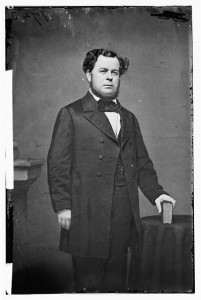
Stephen Mallory's 1861: U.S. Senator from Florida to CSA Navy Secretary
The following were the resolutions referred to:
Resolved I. That in our opinion each of the Southern States should as soon as may be, secede from the Union.
Resolved 2. That provision should be made for a Convention to organize a Confederacy of the Seceding States, the Convention to meet not later than the 15th of February, at the City of Montgomery, in the State of Alabama.
Resolved, That in view of the hostile legislation that is threatened against the Seceding States, and which may be consumated [sic in original, for it seems his secession mania extended even into orthography] be fore the 4th of March, we ask instructions whether the delegations are to remain in Congress until that date for the purpose of defeating such legislation.
Resolved, That a Committee be and are hereby appointed, consisting of Messrs. DAVIS, SLIDELL, and MALLORY, to carry out the objects of this meeting.
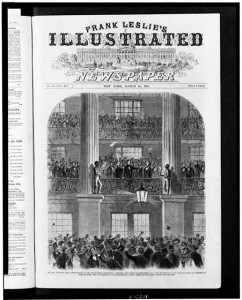
Right on schedule - Jeff Davis in Montgomery 2-16-1861
It will thus be seen that this remarkable letter, which breathes throughout the spirit of the conspirator, in reality lets us into one of the most important of the numerous secret conclaves which the plotters of treason then held in the Capital. It was then, as it appears, that they determined to strike the blow and precipitate their States into secession. But at the same time they resolved it would be imprudent for them then openly to withdraw, as in that case Congress might pass “force, loan, and volunteer bills, which would put Mr. LINCOLN in immediate condition for hostilities.” No, No! that would not do. (So much patriotic virtue they half suspected, half feared was left in the country.) On the contrary, “by remaining in our places until the 4th of March, it is thought we can keep the hands of Mr. Buchanan tied, and disable the Republicans from effecting any legislation which will strengthen the hands of the incoming Administration.” Ah! What a tragic back-ground, full of things unutterable, is there there! It appears, however, that events were faster than they, and instead of being able to retain their seats up to the 4th of March, they were able to remain but a very few weeks. JEFF. DAVIS withdrew on the 21st of January — just a fortnight after this “consultation.” But for the rest, mark how faithfully the programme here drawn up by this knot of traitors in secret session, was realized. Each of the named States, represented by this cabal, did, “as soon as may be, secede from the Union” — the Mississippi Convention passing its ordinance on the heels of the receipt of these resolutions, on the 9th of January, Florida and Alabama on the 11th, Louisiana on the 26th, and Texas on the 1st of February; while the “organization of the Confederate Government” took place at the very time appointed, DAVIS being inaugurated on the 18th of February. And here is another plot of the traitors brought to light. These very men, on withdrawing from the Senate, urged that they were doing so in obedience to the command of their respective States. As DAVIS put it, in his parting speech, “the ordinance of secession having passed the Convention of his State, he felt obliged to obey the summons, and retire from all official connection with the Federal Government.” This letter of YULEE’s clearly reveals that they had themselves pushed their State Conventions to the adoption of the very measure which they had the hardihood to put forward as an imperious “summons” which they could not disobey! ‘Tis thus that Treason did its work.
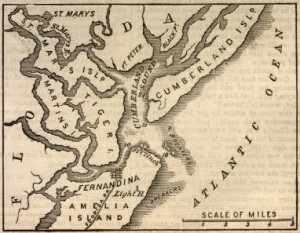
Yulee's 'affrighted gaze' at Union fleet in harbor
But how has Time brought round his revenges. A little more than a year after the date of this epistle, YULEE, the writer of the letter, and FINEGAN, the correspondent to whom it was addressed, were both at Fernandina, Fla. Suddenly before their affrighted gaze the fleet of the Union makes its appearance in the harbor. They and the rebel soldiery are fain to take to flight by the railroad, away from the wrath to come. And they were just in time, for one of DUPONT’s gunboats sent a shell into the rear car, and YULEE had but time to escape to the lagoons where he will have ample opportunity to meditate on the sacredness of that oath which he took to support the Constitution of the United States. Moreover — for this affair like the rest of the rebellion, is full of its dramatic elements — this same Florida railroad also plays a not unimportant part in the farce-fiasco of YULEE, Florida and secession. He and FINEGAN — Jew and Irishman — were co-contractors on it, and the Senator was constantly chasing Government for fat mail contracts and subsidies. He succeeded better than he deserved; but it is well known that it was because his Jew heart did not get all it craved that he urged the secession of Florida — and, like the base Judean, threw away a pearl richer than all his tribe.
The excellent Civil War Florida has a lot of information about Fernadina.
In addition to being a politician and owning a sugar cane plantation David Levy Yulee is known as the “Father of Florida Railroads”. Levy was the first Jew elected to the U.S. senate and experienced anti-Semitic attacks throughout his life. (See last Times paragraph above.) Levy left the senate two weeks after this letter was written. He served in the Confederate Congress.
Speaking of Florida, here is more evidence of the Union blockade’s effectiveness. It seems to be more suggested Southern resilience and is almost literally making lemonade out of lemons. From the Richmond Daily Dispatch March 19, 1862:
Lemons and limes.
–We are informed that throughout our State, particularly in the eastern and southern portions, there has been a fine crop of lemons and limes grown this year, which are now being permitted to rot, there being no market for them, in consequence of the blockade.
We have been requested to suggest to the owners of such fruit the propriety of expressing the juice from them, and bottling it up. There are thousands of old bottles that are now useless, and there would be no difficulty in the way in this respect. It would require but little labor, will keep well, and meet with a ready sale throughout she Confederacy, particularly to our armies. We hope our contemporaries throughout the State will call attention to this matter. –Florida Dispatch.
The map of Fernadina harbor was published in Harper’s Weekly and can be viewed with other southern harbor maps at Son of the South.
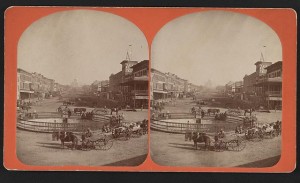
Hazy look back (in 1879) - where President Davis inaugurated

